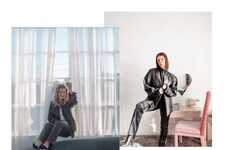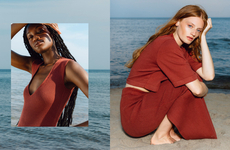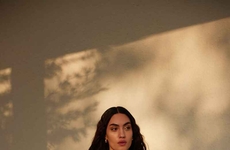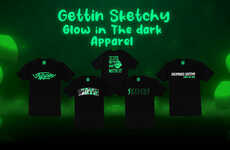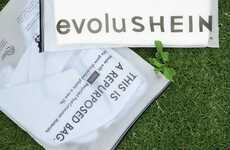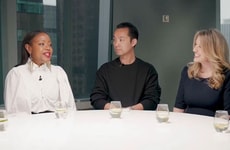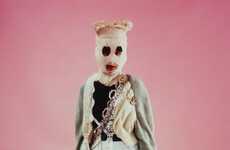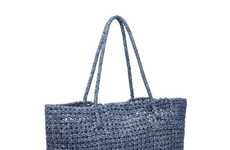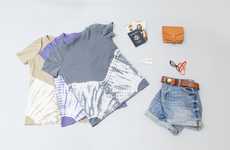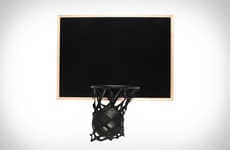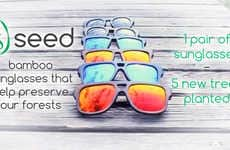
Shannon Whitehead and Kristin Glenn
Bianca — March 30, 2012 — Social Good
References: allofusrevolution
Ready to meet the brains behind the most-funded fashion project in Kickstarter.com's history? (796 backers pledged over $64,000, which was more than three times their goal!)
It wasn't too long ago that we featured a social business called All of Us Revolution, a fashion line built around the idea of reducing consumption without sacrificing fashion.
Inspired to learn more about its young founders, Shannon Whitehead and Kristin Glenn -- two young Americans who met in a bar in Australia -- we decided to ask them a few questions about their business, about life as social entrepreneurs, and how they manage to keep their creativity flowing.
4 Questions With Shannon Whitehead and Kristin Glenn, Founders of All of Us Revolution
1. How did the idea for the business model come about?
We were traveling in Central America together when we saw a need for a line of stylish travel apparel that could fit in a backpack. We started designing 10 pieces that could be mixed and matched to create over 100 different looks. The idea was born, and we went back to the States to start researching sustainable ways to manufacture the line. It was important to us that our business didn’t harm the planet or the people in it. After over a year of dead-ends, we finally found an American manufacturer and a way to source recycled fabrics.
We started by launching our first piece, the Versalette (see in the gallery), one garment that can be worn over 15 different ways -- as a skirt, dress, shirt, scarf, hood, purse and more. We set up a pre-sales model through Kickstarter and ended up becoming the most-funded fashion project in Kickstarter history.
2. How did you decide to join this sector?
When we went to Central America we knew we wanted to start a business, but we weren’t sure what that looked like. We’ve never considered ourselves fashionistas, but we saw a niche that needed to be filled and went with it. There are a lot of things wrong with the fashion industry in terms of the waste, energy use, exploitation, etc. and we felt compelled to help change consumption habits, as a whole. So, it’s probably more accurate to say we’re one-third in the fashion sector and two-thirds in the environmental sector.
3. How do you get your inspiration?
Travel. When you see parts of the developing world that force you to reflect on your own life and habits, you can’t help but be changed. We saw places so rich in culture and so full of life that we couldn’t help but wonder why they should bear the brunt of the western world’s consumption. These experiences inspired us to start thinking about our own shopping habits, where our clothes come from and to start asking the same questions of others.
4. How do you reset yourself to be creative? Do you have any rituals?
Things are incredibly busy right now, so there doesn’t seem to be a whole lot of time to reset! We try really hard to use the Pomodoro technique throughout the day -- 25-minutes of work and then a five minute break, and repeat. It’s so important to take breaks and re-energize; we’re working on meditation too, but that’s a work in progress!
5. What are the future plans for {r}evolution apparel?
We’re planning a Sustainable Fashion Tour of the west coast for this summer. We’re roadtripping from Vancouver to San Francisco with a mobile pop-up shop to spark conversations about consumption and where our clothes come from. We hope to meet up with other like-minded sustainable fashion people and anyone else who wants to learn more about how we can reduce our impact on the planet.
It wasn't too long ago that we featured a social business called All of Us Revolution, a fashion line built around the idea of reducing consumption without sacrificing fashion.
Inspired to learn more about its young founders, Shannon Whitehead and Kristin Glenn -- two young Americans who met in a bar in Australia -- we decided to ask them a few questions about their business, about life as social entrepreneurs, and how they manage to keep their creativity flowing.
4 Questions With Shannon Whitehead and Kristin Glenn, Founders of All of Us Revolution
1. How did the idea for the business model come about?
We were traveling in Central America together when we saw a need for a line of stylish travel apparel that could fit in a backpack. We started designing 10 pieces that could be mixed and matched to create over 100 different looks. The idea was born, and we went back to the States to start researching sustainable ways to manufacture the line. It was important to us that our business didn’t harm the planet or the people in it. After over a year of dead-ends, we finally found an American manufacturer and a way to source recycled fabrics.
We started by launching our first piece, the Versalette (see in the gallery), one garment that can be worn over 15 different ways -- as a skirt, dress, shirt, scarf, hood, purse and more. We set up a pre-sales model through Kickstarter and ended up becoming the most-funded fashion project in Kickstarter history.
2. How did you decide to join this sector?
When we went to Central America we knew we wanted to start a business, but we weren’t sure what that looked like. We’ve never considered ourselves fashionistas, but we saw a niche that needed to be filled and went with it. There are a lot of things wrong with the fashion industry in terms of the waste, energy use, exploitation, etc. and we felt compelled to help change consumption habits, as a whole. So, it’s probably more accurate to say we’re one-third in the fashion sector and two-thirds in the environmental sector.
3. How do you get your inspiration?
Travel. When you see parts of the developing world that force you to reflect on your own life and habits, you can’t help but be changed. We saw places so rich in culture and so full of life that we couldn’t help but wonder why they should bear the brunt of the western world’s consumption. These experiences inspired us to start thinking about our own shopping habits, where our clothes come from and to start asking the same questions of others.
4. How do you reset yourself to be creative? Do you have any rituals?
Things are incredibly busy right now, so there doesn’t seem to be a whole lot of time to reset! We try really hard to use the Pomodoro technique throughout the day -- 25-minutes of work and then a five minute break, and repeat. It’s so important to take breaks and re-energize; we’re working on meditation too, but that’s a work in progress!
5. What are the future plans for {r}evolution apparel?
We’re planning a Sustainable Fashion Tour of the west coast for this summer. We’re roadtripping from Vancouver to San Francisco with a mobile pop-up shop to spark conversations about consumption and where our clothes come from. We hope to meet up with other like-minded sustainable fashion people and anyone else who wants to learn more about how we can reduce our impact on the planet.
Trend Themes
1. Sustainable Fashion - Creating clothing that is stylish, functional, and environmentally responsible produces great opportunities for moving away from the outdated fashion industry.
2. Travel Apparel - Development of stylish apparel that can be easily packed for travel and still provide multiple outfit options is making a comeback.
3. Social Entrepreneurship - Combining business opportunities with social responsibility continues to inspire entrepreneurs to innovate and create products with meaningful, positive impact.
Industry Implications
1. Fashion Industry - There is plenty of room in the fashion industry for clothing made with sustainable materials and designed for easy travel.
2. Tourism Industry - Sustainable travel inspires the development of innovative travel apparel and raises awareness of consumption reduction.
3. Entrepreneurial Industry - Social entrepreneurship continues to create space for businesses that embody both innovation and social responsibility.
1.7
Score
Popularity
Activity
Freshness

